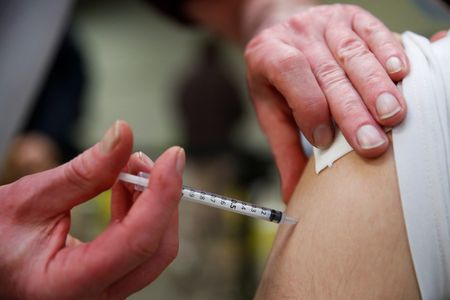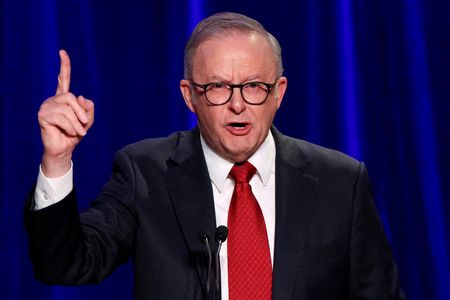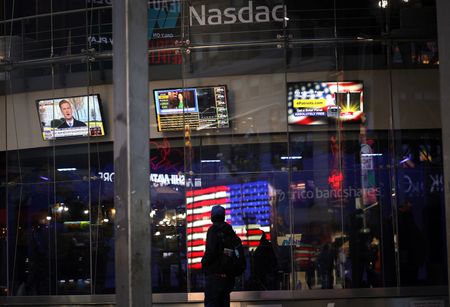By Patrick Wingrove and Mariam Sunny
(Reuters) -Moderna said on Friday that the U.S. FDA paused a late-stage trial of its experimental norovirus vaccine after a case of a rare neurological side effect was reported.
The trial of the vaccine, dubbed mRNA-1403, was put on clinical hold following a single adverse event report of a case of Guillain-Barre syndrome, which is currently under investigation, Moderna said.
A Moderna executive said during a conference call that the case of Guillain-Barre was reported relatively soon after the vaccine’s administration, although it was difficult to determine a causal relationship between the two.
“The FDA needs time to review the materials we submitted and they may come back with questions,” an executive said.
The company said enrollment for the norovirus vaccine trial had been completed in the Northern Hemisphere and that it does not expect delays in Southern Hemisphere enrollment.
Moderna has been banking on revenue from newer mRNA shots to make up for waning post-pandemic demand for COVID-19 vaccines and less-than-expected uptake of its respiratory syncytial virus vaccine, which sent shares down nearly 60% last year.
Shares of Moderna, along with other vaccine makers, dropped further this year as lawmakers advanced U.S. President Donald Trump’s pick for Health and Human Services Secretary Robert F. Kennedy through Congress. Kennedy, an outspoken vaccine critic, was confirmed to the role on Thursday.
Moderna’s total revenue for the fourth quarter fell nearly 66% to $966 million, but beat analysts’ expectations of $942.84 million. Most of those sales were generated by the COVID shot, which brought $923 million, compared to $15 million for its RSV vaccine.
Despite the clinical hold, Moderna shares were up more than 4% at $33.31 in afternoon trading, far below its 52-week high of around $170 and pandemic all-time high of over $484.
The vaccine maker said in January it would slash cash costs by $1 billion, as well as by an additional $500 million in 2026.
“We saw appropriate reductions and… evidence of Moderna beginning to cut costs to be able to manage a lower revenue line more appropriately,” Bernstein analyst Courtney Breen said.
The company reported a larger-than-expected quarterly loss of $2.91 per share, compared to analysts’ expectations of a $2.68 per share loss, according to LSEG data. It posted a profit of 55 cents per share last year.
Finance chief James Mock in an interview attributed the loss to a $238 million non-cash charge related to the termination of its agreement with a contract manufacturer.
“As we looked at our manufacturing footprint, we believed we did not need that particular (manufacturer) and tried to eliminate the potential waste related to that capacity,” he said, declining to identify the manufacturer.
Moderna first announced it would scale down manufacturing of its Spikevax COVID-19 vaccine in late 2023, including at contract drug manufacturer Lonza’s facility in Switzerland, as part of an effort that reduced cost of sales by $3.2 billion last year.
Mock said on the call that the company believed the COVID market would remain durable over time and there was still long-term opportunity to expand its RSV market.
Moderna reiterated its full-year 2025 product sales forecast of $1.5 billion to $2.5 billion, most expected in the second half of the year.
(Reporting by Mariam Sunny and Christy Santhosh in Bengaluru, and Patrick Wingrove in New York; Editing by Sriraj Kalluvila, Nia Williams and Bill Berkrot)











